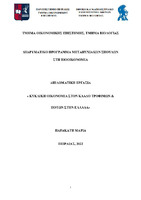Κυκλική οικονομία στον κλάδο τροφίμων & ποτών στην Ελλάδα
Circular economy : food and drink sector in Greece

View/
Keywords
Κυκλική οικονομία ; Κλάδος τροφίμων και ποτών ; Ελλάδα ; Circular economy ; Food and beverage sustainabilityAbstract
The present work was prepared in the framework of the postgraduate program of the
Department of Economics of the University of Piraeus and the Department of Biology
of the National and Kapodistrian University of Athens.
The main purpose was to investigate the companies in the food and beverage sector in
Greece regarding their transition to the circular economy. The food and beverage
industry is an important sector for the national economy, since it is one of the main
pillars of Greek processing, as a lever for the development of productive activity, but
also for the development course of the country. Through this research, it was found out
whether the specific companies have a good understanding of the circular economy,
what ways they have applied for its adoption as well as what they intend from its
implementation. To achieve the goal, literature and empirical research were conducted,
which are presented below.
In the first chapter of the work, a literature survey on the creation and implementation
of the model of the circular economy was investigated. More specifically, the
implementation of a sustainable development model is considered necessary.
The second chapter deals with the importance of the food and beverage sector in the
world economy and in Greece.
Further, the importance of the adoption of a cyclical model in the specific industry and
whether it benefits businesses, industry and consequently the environment was
examined. Based on the answers to the 22 questionnaires that were collected, it was
appeared that companies have understood the circular economy as a system of good
practices for the environment.
The important fact was that 68% of companies already apply the principles of the
circular economy and 27% are interested to follow them.
By overcoming structural problems such as lack of awareness of the need to implement
cyclical production models, existing policies and high investment costs, it seems to be,
that food and beverages in Greece and consequently in Europe beyond the standard of
safe, nutritious and high quality food can become global sustainability.


